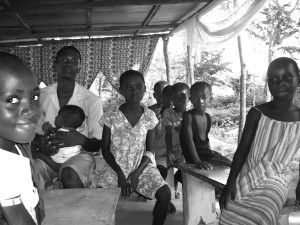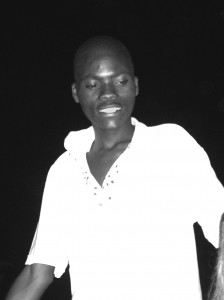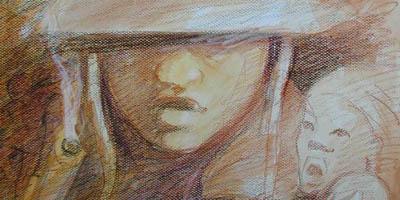While volunteering in Ghana, 22-year-old Jenna Macdonald from Tiverton, Ontario, was asked to buy 250 chickens and a coop for the children of Good Shepherd Orphanage. She had already paid an $800 “volunteer fee” and seen the orphanage administration refuse to pay fifty Ghana cedis ($37 Cdn) for a young staff member’s malaria treatment, which resulted in his death.
“When I met with the orphanage owner, Bishop Kwaku Addei, he wanted me to give him $350 cash for the coop. I was apprehensive about that, but it always seemed to be money first and action later in Ghana.”
“We’re there to help with the kids.”
The Good Shepherd Orphanage founder and director is Kwaku Addei, a bishop in the Great Word of God Church, which he also founded. He denies that the orphanage misuses volunteer funds and maintains that volunteers are generally happy with their experience.

“There are good volunteers who come to the orphanage without any problems,” he said. “And there are some who only come here to criticize the work we are doing. Nobody gives me money for the upkeep of the children. Only some individuals and churches donate to support the children. We pay electricity bills, teachers, and internet bills without any volunteer contributions. Young volunteers should not condemn what we are doing here.”
However, Ian Nowosad is another volunteer like Jenna who is concerned about mishandling of volunteers’ donations. While he was at Good Shepherd Orphanage, he gave the children’s primary caregiver, “Mama,” an extra five dollars every day so that she could buy them nutritious food. Ian worked at the orphanage for over six weeks and he never saw the kids’ meals improve.
It eventually became clear that Mama was pocketing the money. “It really seems like the staff take our donations and use the money to better their own lifestyles,” Jenna said. “The kids are crammed into small dormitories while the orphanage administrators have well furnished houses on the property.”
Orphanage corruption has become a primary focus for some NGOs. “Material gain and personal gain override the best interest of the child,” said the Projects Director of Orphan Aid Africa, Richard Adabrah-Klu. “A majority of orphanages are seen as a source of livelihood rather than child care centers.”
“Running an orphanage in Ghana has become a business enterprise, a highly lucrative and profitable venture,” UNICEF child specialist, Eric Okrah, said in an interview with the United Nation’s Integrated Regional Information Networks. “Children’s welfare at these orphanages has become secondary to the profit motive.”
“Institutions for children are least appropriate for the development of the child,” said Joachim Theis, UNICEF’s West and Central Africa Regional Chief of Child Protection. “And they may be places where serious child abuse is taking place.”
UNICEF is promoting reform that would see the institutionalization of children as a last resort in order to reduce the possibility of child exploitation. The levels of child abuse have at times been severe. In 2006 the Domestic Violence Victims Support Unit of the Ghanaian Police Service reported 345 rape cases and 1427 reports of defilement of children. Upon investigating allegations of abuse at the Peace and Love Orphanage, authorities found that 27 of the 32 children living there were not orphans.
The discovery is consistent with a study conducted by the Social Welfare Department of Ghana in January 2009, which revealed that 90 percent of the approximately 4,500 children in Ghanaian orphanages have one or both parents. This is because some African families, particularly those in deprived rural communities, are offered money for their children, and are promised that the orphanage will cover the cost of their children’s education.
“Orphanage staff exploit the poverty and ignorance of parents,” said Bright Appiah, director of Child Rights International, a Ghanaian NGO. In an interview with IRIN, Appiah claimed that orphanage administrations take advantage of families seeking better education or work opportunities by encouraging them to leave their children in institutional care. Thus, orphanages are using the needy and their children in order to make a profit. Appiah believes that as little as 30 percent of the funding Ghanaian orphanages receive is actually spent on childcare.
The Ghanaian government’s 2008 report on “The Care Reform Initiative for Orphans and Vulnerable Children” states, “a good number of these homes and orphanages are poorly run and more often do not comply with either national or international standards and requirements.” The report also cites studies that show that “children raised in institutions often have psychological problems of insecurity and emotional instability due to the detachment from a consistent close care giver.”
The government of Ghana launched the Care Reform Initiative in 2006. Working with groups like Orphan Aid Africa, Child Rights International, and UNICEF, its purpose is to prevent children from entering orphanages, resettle the children currently in orphanages in family contexts, and support the Department of Social Welfare monitoring of children without suitable parental care.
“It is widely perceived that orphanages provide food and humanitarian services without considering the harm they do to children,” said Orphan Aid Africa’s, Richard Adabrah-Klu. “They draw a lot of sympathy from the donor community and public in general. But this is only because people are unaware of the harms that these orphanages pose to the future of these children.”
Emmanuel’s Story
As a young Canadian with an interest in international development and a passion for travel, I jumped at the chance to volunteer in Ghana in the summer of 2009. I admit that part of me wanted to go and make a difference, but I also realized that I was going to be a guest, a spectator, in this African country. I believe that I had a positive impact on the children at Good Shepherd Orphanage.

Working with them was both eye opening and incredibly fun. Emmanuel’s story, however, overshadowed the experience.
I met Emmanuel when I volunteered at the Good Shepherd Orphanage International School. A twenty-one year old from Togo, he taught French at the orphanage. He had only been working in Ghana for nine months when he contracted malaria. He died less than a week later.
The orphanage staff members did not take Emmanuel to the hospital when he started to show symptoms of malaria. Only once our group of Canadian volunteers learned of his illness and demanded they take him to the hospital, along with a volunteer who also needed medical testing, did he finally go. At the hospital the doctor tried to draw blood from Emmanuel, but it was nearly impossible because the disease had made him severely anemic. The doctor advised the pastor who accompanied us to the hospital that Emmanuel needed a blood transfusion.
When we heard about the possibility of a transfusion we had no idea how necessary it was. We were asked for fifty Ghana cedis ($37) to pay for the treatment, but with no way to withdraw money and having paid for the pastor’s lunch, gas, oil change, and the hospital fees, we simply did not have the funds available to pay at that time. Unfortunately the hospital required payment before treatment. The pastor refused, and Emmanuel did not get the transfusion.
Hours later, the pastor notified us volunteers that Emmanuel had taken a turn for the worst. He said that if we covered the cost, he would go to the hospital and ensure that Emmanuel received the transfusion. We agreed, but insisted he take us to the hospital with him. Upon arriving we were shocked to find Emmanuel dead.
We were then horrified when the pastor slapped the corpse on the stomach and said, “That’s it. He’s dead.”
– Julia Pyper




Neil Palmer
Yep this has been similar to my experience “helping” a so called Ghanian Orphanage. This was worse as they appear to have deliberately enabled a fraud of even more money. Ghana really needs to clean up its act and take serious action.